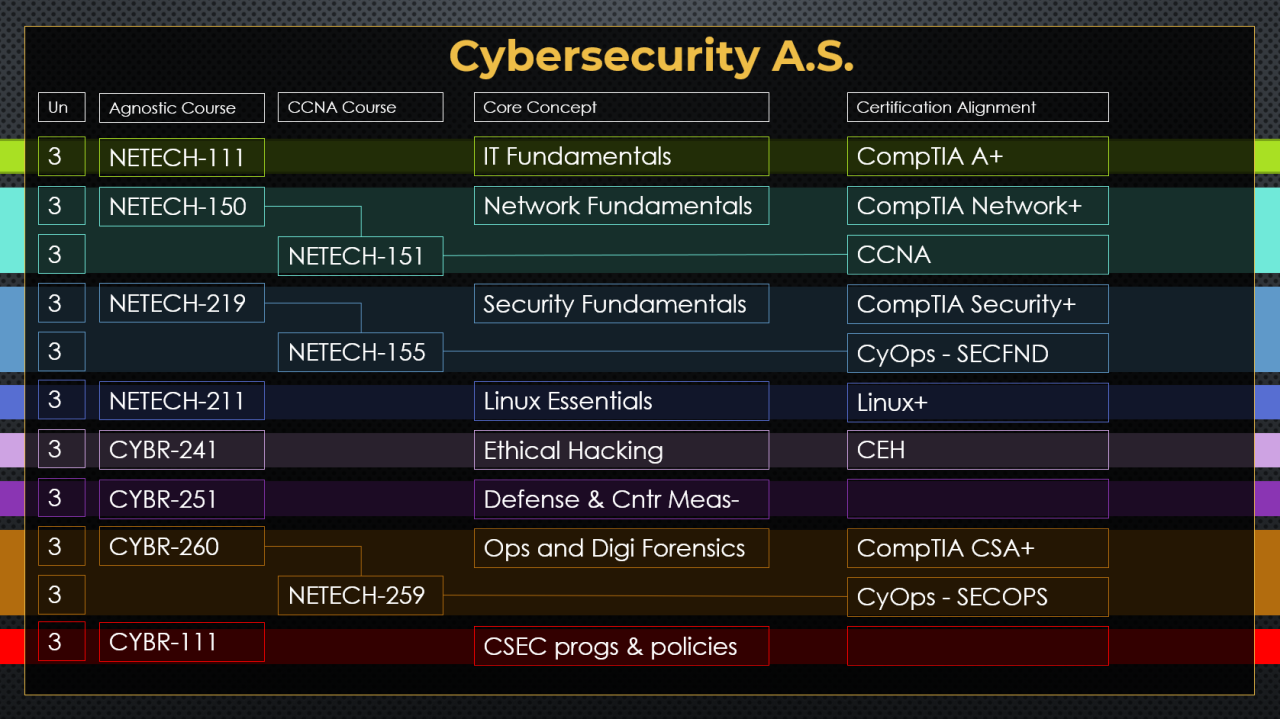
A Bachelor Degree of Cyber Security is your gateway to a career at the forefront of digital defense. In today’s interconnected world, cyber threats are ever-evolving, demanding skilled professionals to protect our data and systems. This degree equips you with the knowledge and skills to navigate the complex landscape of cyber security, from understanding the latest threats to implementing robust security measures.
Cybersecurity is not just about preventing attacks; it’s about building resilient systems and fostering a culture of security awareness. You’ll delve into the intricacies of network security, data protection, and ethical hacking, learning to identify vulnerabilities and implement solutions to safeguard sensitive information.
Introduction to Cyber Security

In today’s digital world, where technology permeates every aspect of our lives, cyber security has become an indispensable element for individuals, organizations, and governments alike. The rapid growth of interconnected devices, the increasing reliance on digital infrastructure, and the proliferation of sensitive data online have made cyber security a critical concern.
Cyber security is the practice of protecting computer systems and networks from unauthorized access, use, disclosure, disruption, modification, or destruction. It encompasses a wide range of technologies, processes, and practices designed to safeguard digital assets and ensure their confidentiality, integrity, and availability.
Cyber Security Incidents
Cyber security incidents have become increasingly frequent and sophisticated, posing significant threats to individuals, businesses, and critical infrastructure. These incidents can result in financial losses, reputational damage, data breaches, and even disruptions to essential services.
Here are some recent high-profile cyber security incidents:
- In 2020, the SolarWinds hack targeted multiple government agencies and private companies, compromising their systems through a malicious software update. The attack, attributed to Russian state-sponsored hackers, exposed the vulnerability of supply chains and highlighted the importance of securing software development processes.
- In 2021, the Colonial Pipeline ransomware attack shut down a major fuel pipeline in the United States, causing fuel shortages and widespread panic. The attack, carried out by the DarkSide ransomware group, demonstrated the potential for cybercriminals to disrupt critical infrastructure and cause significant economic damage.
- In 2022, the Log4j vulnerability, a critical security flaw in a widely used Java logging library, affected countless applications and services worldwide. The vulnerability allowed attackers to execute arbitrary code on vulnerable systems, potentially enabling them to gain control over affected devices and steal sensitive data.
Types of Cyber Threats
Cyber threats can be categorized into various types, each with its unique characteristics and methods of attack. Understanding these threats is crucial for developing effective cyber security strategies.
- Malware: Malicious software designed to harm computer systems or steal data. Examples include viruses, worms, Trojans, ransomware, and spyware.
- Phishing: A social engineering technique used to trick individuals into revealing sensitive information, such as login credentials or credit card details, by disguising as legitimate sources.
- Denial-of-service (DoS) attacks: Attempts to overwhelm a target system or network with traffic, making it unavailable to legitimate users. These attacks can disrupt business operations, website access, and critical services.
- Social Engineering: Manipulating individuals into divulging confidential information or performing actions that compromise security. This can involve phishing, pretexting, and baiting techniques.
- Insider threats: Malicious or negligent actions by individuals with authorized access to sensitive information or systems. Insider threats can pose significant risks, as they often have legitimate credentials and knowledge of internal systems.
Vulnerabilities
Vulnerabilities are weaknesses in software, hardware, or configurations that can be exploited by attackers to gain unauthorized access or cause harm. These vulnerabilities can be present in operating systems, applications, network devices, and even physical security measures.
- Software vulnerabilities: Bugs or flaws in software code that can be exploited by attackers to gain control over systems or steal data. Regular software updates and patching are essential to mitigate these vulnerabilities.
- Hardware vulnerabilities: Weaknesses in hardware components that can be exploited by attackers to gain unauthorized access or cause damage. These vulnerabilities can arise from design flaws, manufacturing defects, or physical tampering.
- Configuration vulnerabilities: Inadequate security settings or configurations that can expose systems to attacks. This can include weak passwords, open ports, and lack of access controls.
- Human vulnerabilities: Errors or negligence by individuals can create vulnerabilities that attackers can exploit. This can include clicking on malicious links, using weak passwords, or failing to implement security best practices.
Bachelor Degree in Cyber Security

A bachelor’s degree in cyber security provides a comprehensive understanding of the field, equipping graduates with the skills and knowledge to protect organizations and individuals from cyber threats.
Typical Curriculum
A typical cyber security curriculum includes a wide range of courses covering both technical and non-technical aspects of the field.
- Core Courses: These courses lay the foundation for understanding cyber security principles and concepts. Examples include Introduction to Cyber Security, Computer Networks, Operating Systems, Programming, and Data Structures.
- Specialized Courses: These courses delve deeper into specific areas of cyber security. Examples include Network Security, Data Security, Ethical Hacking, Cryptography, Forensics, and Incident Response.
- Practical Applications: Many programs include hands-on labs and projects to apply theoretical knowledge to real-world scenarios. This practical experience is crucial for developing essential skills.
Specializations in Cyber Security
Cyber security offers several specialization options, each focusing on a specific area of expertise.
- Network Security: This specialization focuses on protecting computer networks from unauthorized access, use, disclosure, disruption, modification, or destruction. Network security professionals are responsible for implementing and maintaining firewalls, intrusion detection systems, and other security measures to safeguard network infrastructure.
- Data Security: This specialization focuses on protecting sensitive data from unauthorized access, use, disclosure, disruption, modification, or destruction. Data security professionals are responsible for implementing and maintaining data encryption, access control, and other security measures to safeguard sensitive information.
- Ethical Hacking: This specialization involves using hacking techniques to identify and exploit vulnerabilities in systems and networks. Ethical hackers work to improve security by testing systems and identifying weaknesses before malicious actors can exploit them. Ethical hackers must adhere to strict ethical guidelines and legal regulations.
Skills and Knowledge Gained
A cyber security degree provides students with a wide range of valuable skills and knowledge, including:
- Technical Skills: Students gain expertise in network security, cryptography, operating systems, programming, and other technical areas. This allows them to analyze vulnerabilities, implement security measures, and respond to incidents.
- Problem-Solving Skills: Cyber security professionals must be able to think critically and solve complex problems. They need to analyze threats, identify vulnerabilities, and develop effective solutions to mitigate risks.
- Communication Skills: Effective communication is crucial in cyber security. Professionals must be able to explain technical concepts to non-technical audiences, collaborate with colleagues, and communicate effectively with stakeholders.
- Ethical Considerations: Cyber security professionals must be aware of ethical implications and legal frameworks related to their work. They need to understand the importance of responsible and ethical practices in the field.
Career Paths in Cyber Security: Bachelor Degree Of Cyber Security

The field of cyber security offers a diverse range of career paths, each with its own unique set of responsibilities and skills. From protecting sensitive data to responding to cyberattacks, cyber security professionals play a crucial role in safeguarding individuals, organizations, and nations from cyber threats.
Career Paths in Cyber Security
Cyber security careers can be broadly categorized into several distinct paths, each requiring a specific skillset and expertise.
- Security Analyst: Security analysts are responsible for identifying, analyzing, and mitigating cyber threats. They monitor security systems, investigate security incidents, and implement security controls to protect networks and systems from attacks. They require strong analytical skills, knowledge of security tools and technologies, and the ability to think critically and creatively to solve complex security problems.
- Security Engineer: Security engineers are responsible for designing, implementing, and maintaining security infrastructure. They work with hardware, software, and networks to build secure systems and ensure that security measures are effective. They require a deep understanding of security principles, network architecture, and various security tools and technologies.
- Ethical Hacker: Ethical hackers are authorized to use their skills to identify vulnerabilities in systems and networks before malicious actors can exploit them. They conduct penetration testing, vulnerability assessments, and security audits to help organizations improve their security posture. They require strong technical skills, a deep understanding of hacking techniques, and a strong ethical framework.
- Cybersecurity Manager: Cybersecurity managers are responsible for developing and implementing cybersecurity strategies for organizations. They oversee security teams, manage security budgets, and ensure compliance with security regulations. They require strong leadership skills, strategic thinking abilities, and a deep understanding of cybersecurity best practices.
- Forensic Investigator: Cybersecurity forensic investigators are responsible for investigating cybercrime incidents. They collect and analyze digital evidence, identify attackers, and provide evidence for legal proceedings. They require strong technical skills, a deep understanding of digital forensics techniques, and a keen eye for detail.
- Security Architect: Security architects are responsible for designing and implementing secure systems and applications. They work with developers and engineers to ensure that security is built into systems from the ground up. They require a deep understanding of security principles, network architecture, and software development methodologies.
- Security Researcher: Security researchers are responsible for identifying and analyzing new cyber threats. They conduct research on emerging security vulnerabilities, develop new security tools and techniques, and publish their findings to the cybersecurity community. They require strong technical skills, a passion for cybersecurity, and a commitment to sharing knowledge.
Career Progression in Cyber Security
A typical career progression in cyber security often follows a path from entry-level positions to more senior roles, with increasing responsibility and expertise.
- Entry-Level Roles: Entry-level positions in cyber security typically involve tasks such as monitoring security systems, conducting vulnerability assessments, and responding to security incidents. These roles provide a foundation in cybersecurity principles and technologies, and can serve as a springboard to more specialized roles.
- Mid-Level Roles: Mid-level roles in cyber security involve more complex responsibilities, such as designing security architectures, implementing security controls, and leading security projects. These roles require a deeper understanding of cybersecurity principles and technologies, as well as strong leadership and communication skills.
- Senior Roles: Senior roles in cyber security involve strategic planning, leadership, and management responsibilities. These roles require a broad understanding of cybersecurity, as well as experience in leading teams and managing complex security initiatives.
Importance of Hands-on Experience
In the realm of cybersecurity, theoretical knowledge alone is insufficient. Hands-on experience is crucial for developing practical skills and a deep understanding of real-world threats and defenses. Internships and practical projects provide invaluable opportunities to bridge the gap between theory and practice, equipping students with the essential skills needed to excel in this dynamic field.
Hands-on experience allows students to apply theoretical concepts to real-world scenarios, solidifying their understanding and enhancing their problem-solving abilities. By working on practical projects, students gain a deeper understanding of the intricacies of cybersecurity systems, network security, and ethical hacking techniques. This practical exposure enables them to identify vulnerabilities, implement security measures, and develop effective mitigation strategies.
Benefits of Internships and Practical Projects
Internships and practical projects offer numerous benefits to aspiring cybersecurity professionals. They provide students with:
- Real-world exposure: Internships and projects offer a unique opportunity to gain hands-on experience in a real-world cybersecurity environment. Students can work on actual security challenges, interact with industry professionals, and gain insights into the latest trends and technologies.
- Practical skill development: Internships and projects allow students to develop practical skills such as vulnerability assessment, penetration testing, incident response, and security analysis. They can apply their theoretical knowledge to real-world scenarios and learn to operate security tools and techniques effectively.
- Networking opportunities: Internships and projects provide students with the chance to network with industry professionals, build valuable connections, and explore potential career paths. They can learn from experienced cybersecurity professionals and gain insights into the industry landscape.
- Portfolio building: Internships and projects offer a platform for students to build a portfolio of their work, showcasing their skills and experience to potential employers. A strong portfolio can significantly enhance their job prospects in the competitive cybersecurity job market.
Examples of Real-World Cyber Security Projects, Bachelor degree of cyber security
Students can undertake various real-world cybersecurity projects to gain hands-on experience and enhance their skills. Some examples include:
- Vulnerability assessment of a website or network: Students can conduct a thorough vulnerability assessment of a website or network using industry-standard tools and techniques. This project allows them to identify potential security weaknesses and recommend mitigation strategies.
- Penetration testing of a web application: Students can perform a penetration test on a web application to simulate real-world attacks and identify vulnerabilities that could be exploited by malicious actors. This project helps them understand the attacker’s perspective and develop defensive strategies.
- Incident response simulation: Students can participate in an incident response simulation to learn how to handle security incidents effectively. This project involves identifying the cause of an incident, containing the damage, and recovering from the attack.
- Development of a security awareness training program: Students can develop a security awareness training program for a specific organization or industry. This project involves identifying common cybersecurity threats, developing training materials, and delivering the program to employees.
Future Trends in Cyber Security
The field of cyber security is constantly evolving, driven by the rapid advancement of technology and the increasing sophistication of cyber threats. As new technologies emerge and cybercriminals become more adept at exploiting vulnerabilities, cyber security professionals must stay ahead of the curve and adapt their skills to meet the evolving challenges.
The Impact of Emerging Technologies
The emergence of new technologies is having a profound impact on the cyber security landscape. These technologies create new opportunities for innovation and growth, but they also introduce new vulnerabilities that cybercriminals can exploit.
- Artificial Intelligence (AI) and Machine Learning (ML): AI and ML are transforming the way cyber security professionals work. These technologies can be used to automate tasks, detect threats, and respond to incidents more effectively. For example, AI-powered security systems can analyze vast amounts of data to identify patterns and anomalies that may indicate a security breach. However, AI and ML also present new security risks. Cybercriminals can use these technologies to create more sophisticated attacks and evade traditional security measures.
- Cloud Computing: The adoption of cloud computing has significantly increased the attack surface for cybercriminals. Cloud environments are often complex and distributed, making it difficult to secure them effectively.
- Internet of Things (IoT): The proliferation of IoT devices, such as smart home appliances, wearable devices, and industrial control systems, has created a new wave of security challenges. These devices are often poorly secured, making them easy targets for cybercriminals.
- Blockchain Technology: Blockchain technology has the potential to revolutionize cyber security. Blockchain is a decentralized and immutable ledger that can be used to track and verify transactions, making it difficult for cybercriminals to tamper with data.
- Quantum Computing: Quantum computing is a new type of computing that has the potential to break traditional encryption algorithms. This could have a significant impact on cyber security, as it would make it easier for cybercriminals to access sensitive data.
Concluding Remarks
As you embark on a career in cyber security, you’ll find yourself at the intersection of technology and strategy, playing a vital role in protecting individuals, organizations, and even entire nations from cyber threats. The demand for skilled cyber security professionals is high and continues to grow, offering a rewarding and impactful career path. With a Bachelor Degree of Cyber Security, you’ll be prepared to take on the challenges and opportunities of this dynamic field.
FAQ Explained
What are the job prospects for someone with a cyber security degree?
The job market for cybersecurity professionals is booming. You’ll find opportunities in various sectors, including government, finance, healthcare, and technology. Common roles include security analysts, penetration testers, security engineers, and incident responders.
What are the typical salary expectations for cyber security professionals?
Salaries for cybersecurity professionals are competitive and vary based on experience, location, and specialization. Entry-level positions often start in the mid-50,000s, with experienced professionals earning significantly more.
What are the essential skills for a successful career in cyber security?
Besides technical skills, strong analytical and problem-solving abilities are crucial. You’ll also need excellent communication and interpersonal skills to collaborate with teams and explain complex technical concepts to non-technical audiences.




